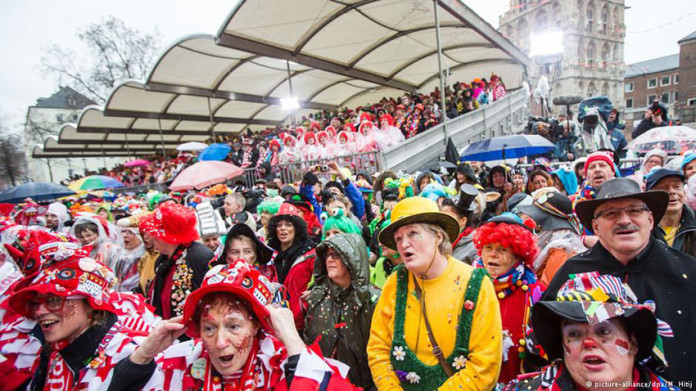The Düsseldorf Carnival Committee has cancelled the city’s parade due to the on-coming low-pressure system, Ruzica. With fellow major carnival city Mainz also calling a raincheck, the duties fall to Cologne’s revellers.
The Düsseldorf Carnival Committee assured carnival-goers on Monday that an alternative date for this year’s parade would be found as “quickly as possible.”
A spokesperson for the committee said that after early morning discussions, the parade could not be authorized due to the expected storm.

As carnival fever was due to peak on Monday, parts of the German state of North Rhine-Westphalia were expected to see winds of up to 100 kilometers per hour (60 mph).
Thunderstorms and heavy showers with lightning were also due to strike, but temperatures were expected to stay relatively warm at 10 degrees Celsius (50 degrees Fahrenheit).
The severe weather warning also dampened carnival cheer in other parts of the Rhineland region, with authorities calling off parades in Mainz, Duisburg, Münster and Hagen.
Cologne marches on
In Cologne, city authorities decided to go ahead with Monday’s parade, albeit with restrictions. Police banned any large flags, placards or figurines from being used on the floats. Participants were also asked to dismantle any heavy installations on carriages and buildings. Horses, roughly 500 in all, were prohibited from taking part in the procession, too.
“The prognosis hasn’t changed since yesterday,” said Cologne parade leader Christoph Kuckelkorn early on Monday.
Carnival climax
The traditional “Rosenmontag” or “Rose Monday” parades are widely seen as the pinnacle of the Rhineland’s carnival season, with colourful and satirical floats alternating with brass bands and dance troupes. Around half a million people usually turn out to watch their local parade and collect “Kamelle” – sweets and small novelties which are thrown into the crowds.
Carnival, also called the “fifth season” in Germany, is a traditional period of celebration ahead of the Christian period of abstinence known as Lent, with a political angle stemming from public criticism of 19th-Century French rule in the parts of western Germany where the tradition is most beloved.
Cologne police record 22 cases of sexual assault at Carnival
The number of sexual assaults at the start of Cologne’s Carnival has more than doubled since 2015. Authorities believe the increase is largely due to an increased willingness to report incidents.
German police and Carnival revellers

Cologne’s police Director Michael Temme confirmed on Friday that authorities received reports of 22 sexual offences on “Weiberfastnacht” (Women’s Carnival Day), which is celebrated on the last Thursday before Lent.
During last year’s “Weiberfastnacht,” only nine cases of sexual assault were reported, and 10 in the previous year. Two of the 22 offenses were deemed “serious,” one of which involved a Belgian TV reporter who was groped by a reveller live on air.
“I was shocked,” RTBF journalist Esmeralda Labye said following the incident.
“My piece to camera was chaotic, people showing middle fingers, a man who was having fun miming a sex act behind me – who had no place there – and then most importantly, a hand was placed on my breast.”
The two men seen on-camera seemed to be of European appearance.
The second case involved a woman who was knocked down on her way home in the early hours of Friday morning and “evidently raped,” police said.
Women ‘more willing’ to report incidents
Police attributed the jump in the number of assaults to an increased willingness of victims to report such incidents. Temme said the attacks at New Year’s Eve in Cologne could have influenced the rise in reports.
Among the reports from Thursday was a case in which a bouncer reportedly told a woman that he would only let her into the bar for 25 euros or “Bützje” which is the local term for a “kiss” – a term widely heard during Carnival festivities.
“I don’t want to play that down, but that shows that the willingness of women to report has changed,” Temme said, adding that a year ago, such an incident wouldn’t have been reported.
In addition to the 22 sexual assaults, Cologne police received 143 reports of bodily harm and 30 reports of theft. The number of police officers on the streets of Cologne was doubled for this year’s celebrations to 2,000, 11 of whom were “lightly injured” after attempting to defend themselves.
New Year’s Eve attacks still in mind
Carnival celebrations, which peak during in the six days before the Christian observance of Lent, is an integral part of the culture of Cologne and Germany’s Rhineland area. This year’s festivities came five weeks after a string of sexual assaults in front of Cologne Cathedral at the city’s New Year’s Eve celebrations.
The attacks sparked a nationwide uproar, resulting in the removal of Cologne’s police chief and leading to a heated debate about the integration of asylum seekers. Most of the attackers accused of 446 allegations of sexual assault and three instances of rape in Cologne were described as being of Arab or North African origin.
-DW.COM













